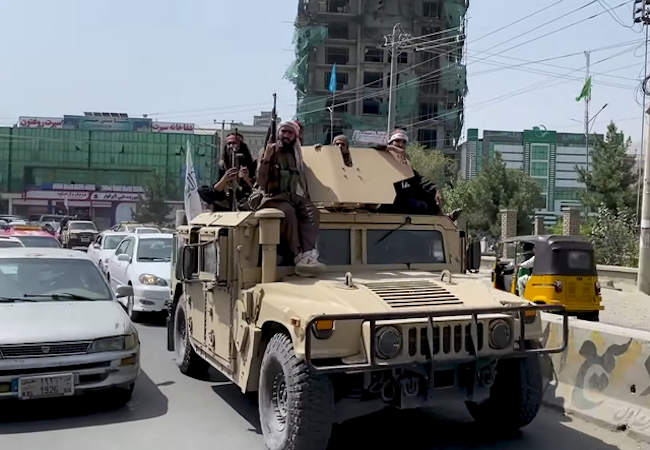Islamic fundamentalists can justify their killings

What do we in the West know about Islam? Perhaps more than we did before 9/11 but not much. Now the US and NATO have withdrawn from Afghanistan we are again reminded how little we understand about Islamic fundamentalism and how its adherents justify their beliefs, not least their use of violence.
When Tony Blair was prime minister of the United Kingdom he was photographed walking along holding the Koran. I wonder how much of it he read? Did he read the verses on violence?
President George W. Bush said repeatedly that Islam was a religion of peace, even though at that time one of the most influential American political writers, Professor Samuel Huntington of Harvard University, had written that it wasn’t fundamentalism that was the problem, it was Islam itself. He argued in his best-selling book, “The Clash of Civilizations” that “the twentieth century conflict between liberal democracy and Marxist-Leninism is only a fleeting superficial phenomenon compared to the continuing and deeply conflictual relationship between Islam and Christianity.”
He foresaw nuclear war between the West and Islam.
This seems to me to be extravagantly over the top. Yet there are many Islamic scholars who make, like Huntington, a departure from what are the historical facts. One is the Oxford professor of contemporary Islamic studies, Tariq Ramadan, in his book, “Islam: The Essentials”.
Quite rightly, he stresses that in the first twelve years of Islam’s existence Mohammed’s followers did not retaliate when persecuted, tortured, and murdered. Ramadan highlights the Koran’s “Hence, if you have to, respond to an attack levelled against you; but to bear yourselves with patience is indeed far better for those who know how to control themselves.”
But, as Ramadan argues, the Koran also said: “Permission to fight is given to those against whom war is wrongfully waged”. Legitimate self-defence was blessed. Ramadan appears to suggest that this is as far as it goes. No offensive violence.
But Ramadan omits to mention the Koran’s verse 9.29- “Fight those who do not believe in Allah, nor in the Last Day, nor forbid what Allah and His Messenger have forbidden, nor abide by the religion of truth.
Offensive violence is sanctified.
It is this verse that sustains the fundamentalists in Al Qaeda and ISIS.
The truth is the Koran faces both ways. Mohammed himself was a general and spent much of the last ten years of his life fighting his opponents in Medina and pushing forward against Roman-occupied Arab lands.
In this way he acted more like an Old Testament leader rather than the total pacific Jesus. As recounted in the Old Testament’s Book of Numbers, Moses told his generals during one battle as they progressed north to the Promised Land, that he had been told by God to order his generals to kill not just the men but also all the women and boys. (The Book of Numbers also famously encourages the Jews to search for “the land of milk and honey”. The Old Testament is revered not just by Jews but also by Christians and Muslims.)
Shortly after Mohammed’s death in AD 632, his father-in-law, Abu Bakr, took over the leadership. His task was to carry out the orders and plans of Mohammed. His first job was to recapture the tribesmen who had defected.
To do so he unleashed on Arabia a war of unprecedented ferocity. Four years after Mohammed’s death he had conquered Syria too. After 10 years the great Persian Empire was subdued.
This laid the basis for Islam’s rapid expansion to the frontier of China and the middle of France. Over the next two centuries it created a vast Afro-Asian-European empire. No other religion has expanded so fast, so far and so violently. None of these fights, apart from the struggle with the Quraysh, might be described as defensive wars.
The non-violent verses of the Koran were contradicted by the teaching of verses 9.29 and also 22.39-40.
In his recent book, “Crusade and Jihad” the esteemed William Polk, who taught Arabic literature and history at Harvard, is the latest writer to obfuscate this debate.
It is a brilliant survey of the Muslim world and its advance. But on the issue of violence it fails to come clean, just as Ramadan and many other writers fail to. The Western world’s most popular serious writer on religion, Karen Armstrong, is among them.
But what Polk does successfully is to give the reader a detailed measure of Islam’s history. The relationship between Christianity and Islam is searchingly recounted.
Christianity, thanks to the foundations laid by a converted Roman emperor, Constantine, became the most vicious and warlike of all the great religions. Its violence often put Islam in the shade and it didn’t exhibit the important virtue of tolerance practiced by Islam.
When a part of the Christian world was conquered by Muslims, Christians were allowed to practice their religion and build their churches.
Polk is the first author I’ve read who explains in full why the Christian world became dominant from the fifteenth century onwards – the growing lack of water in the Middle East, a series of small technological changes in Europe, including the use of printing on a large scale and the invention of the eyeglass.
Most important, some others have argued, is the sophisticated and technologically advanced way the Europeans made use of gunpowder and armaments. None of these, apart from the water issue, seemed to be given the same urgency in the Muslim world.
Now the Islamic fundamentalists want to overturn Christian/Western dominance. If they read this book they will realize they are probably on a hopeless quest.
Nevertheless, to be honest, the Koran is- at least partly- on their side.




